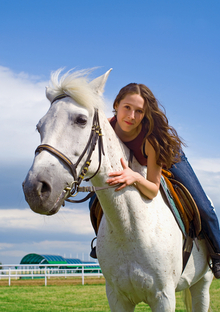With horses living longer, it stands to reason ailments that affect geriatric seniors will also be more prevalent, such as Cushingâs disease, osteoarthritis, gastrointestinal problems, and chronic pain. But what about mental decline? Can horses be affected by senility or dementia, similar to elderly humans?

Kindness and care for every horse
Since cats and dogs have been shown to experience cognizant deterioration, it makes sense that horses could also suffer from dementia.
Surprisingly, there has been very little medical research done in this area. âAlthough research has been done on the older horse, it is really in its infancy,â says equine geriatric specialist Dr. Mary Rose Paradis, associate hospital director at Massachusettsâ Cummings School of Veterinary Medicine, in her essay, Biology of Aging in Horses.
It has long been established that cats and dogs can suffer from dementia; autopsies of both species show the same type of brain lesions as Alzheimerâs patients. If other animals can experience this form of cognizant deterioration, it makes sense that horses could be similarly affected.
In a paper on Forebrain Diseases by Robert J. MacKay, BVSc, of the College of Veterinary Medicine at the University of Florida, he explains that the temporal lobe of the cerebrum controls learning-based behaviour and that any structural, metabolic, or psychological disturbances affecting this area may result in dementia. He goes on to define dementia as âchanges in normal habits, personality, attitude, reaction to the environment, or loss of learned skills.â
Signs and symptoms of equine dementia
According to the Canadian Alzheimerâs Society, human dementias âare fatal, progressive and degenerative diseases that destroy brain cells. They are not a normal part of aging.â Owners of older horses may note the following changes which are all hallmark signs of human dementia: uncharacteristic forgetfulness, confusion, unusual dependency on companions, aimless wandering, depression and even mood changes such as grumpiness.
Dementia is not a condition strictly reserved for older horses, however; it can affect even younger animals if they contract encephalitis, suffer head trauma or an embolism, develop a forebrain lesion or a number of metabolic disorders.
Symptoms may include
- Disorientation in a familiar environment,
- Failure to recognize a handler or object,
- Inability to be led,
- Frequent yawning,
- Head-pressing,
- Irritability,
- Unprovoked kicking or biting,
- Compulsive walking or circling,
- ramatic changes in eating or drinking habits.
Dr. Paradis suggests that owners who feel that something is mentally amiss with their horse â regardless of their age â do not adopt a âwait and seeâ attitude. The problem could be caused by a condition such as loss of vision, brain tumours or liver disease.
If the onset of confusion or disorientation is sudden, it could also herald something extremely serious such as Eastern equine encephalitis, West Nile virus or even rabies. Even severe vitamin B deficiency can cause dementia. âIf people start to see changes in their horseâs personality or something that might appear as confusion, they should call their veterinarian to do a thorough exam and blood work,â advises Paradis.
Dealing with dementia in horses
There are a number of steps you can take to make a horse displaying signs of dementia as comfortable as possible for his remaining years:
- Try to keep the feeding and turnout routine the same daily
- Only turn out with a kind and familiar companion
- Lead directly into his stall or paddock â donât leave him up to his own devices to find his way around.
- Make sure that when turned out your horse is actually using the run-in or other shelter; the concept of staying dry or out of the sun will likely be lost. Blanketing may be necessary in cold weather.
- Monitor paddock time to make sure he is not being bullied or chased from his food.
- Address any pain issues with medication; discomfort can add to distress and disorientation.
- Donât ignore your horse - even old horses need love and regular grooming.
While euthanasia may be inevitable, considerate caretaking can make an older horseâs life more bearable.
